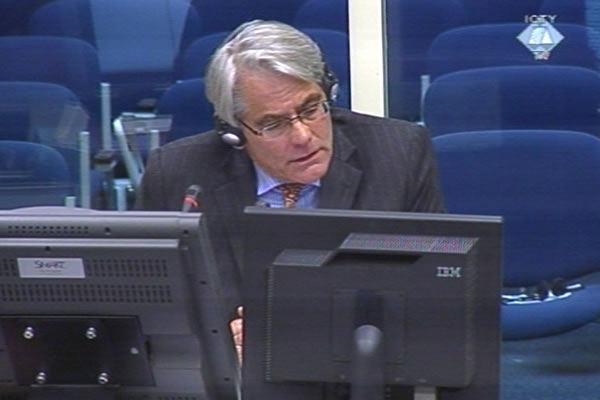Home
MLADIC’S ‘TIRADE OF THREATS’
British general Rupert Smith confirmed at the trial of Ratko Mladic that the commander of the VRS Main Staff had authority over his troops and made all the important decisions. At the same time, Mladic ignored Smith’s warnings about breaches of the Geneva conventions. Instead, Mladic issued threats and realized them, refusing to realize that ‘the Serbs’ actions created such a terrible public impression that the international negotiators rejected their proposals out of hand’
 Rupert Smith, witness at the Ratko Mladic trial
Rupert Smith, witness at the Ratko Mladic trial British general Rupert Smith testified at the trial of Ratko Mladic about his contacts with the Bosnian Serb political and military leadership in 1995. At the time, Smith was the commander of the UN peace-keeping forces in BH. In the examination-in-chief, the witness confirmed that General Mladic had unquestionable authority in the VRS. Mladic made all the important decisions and his orders were obeyed, Smith explained.
As he answered prosecutor Dermot Groome’s questions, General Smith said that his contacts with Mladic led him to conclude that Mladic knew about the VRS snipers firing on civilians in Sarajevo. Smith also found that Mladic ordered his troops to reclaim the heavy artillery placed under the UN control, that he ordered and controlled the operation to take UN members hostage in May 1995, ignored warnings that it was a breach of the Geneva conventions, controlled access to UN protected zones, the movements of humanitarian convoys and finally exercised command in the operation to ethnically cleanse Srebrenica.
Apart from a number of documents used by the prosecution to illustrate those and other claims made by the witness, audio recordings and transcripts of Smith’s telephone conversations with Mladic after the Markale incident on 28 August 1995 were also admitted into evidence. Mladic personally taped the conversations and they were found and seized in Mladic’s wife’s apartment in Belgrade. Mladic didn’t object to their admission into evidence provided they were admitted in their entirety. The prosecution agreed wholeheartedly.
At a meeting in Vlasenica in March 1995, Mladic launched a ‘tirade of threats’ against Smith and the British contingent in UNPROFOR. Mladic said, ‘I will take your Englishmen from Gorazde and cut their heads off in front of cameras, one for each threat, and I will then broadcast it to the public on CNN’. Mladic did realize some of his threats in May 1995, when the VRS captured UN staff on Mladic’s orders, and used them as human shields against NATO air strikes. In several telephone conversations, General Smith warned Mladic that such actions were a violation of the Geneva conventions. General Smith got the impression that it ‘didn’t matter at all’ to Mladic.
General Smith described a meeting with Mladic in Belgrade on 15 July 1995, in the immediate aftermath of the fall of Srebrenica. They discussed the refugee issue and the rescue operation for the UN Dutch Battalion soldiers. According to the British general, the UN had received the reports about crimes from the Bosnian authorities, but such reports were taken with ‘a grain of salt’ and the UN always demanded proof. ‘We knew Srebrenica was being ethnically cleansed, we knew that men were separated from the women and children and that there were killings… this was sad, but I was not surprised. However, I had no idea of the scale of the events unfolding at the time’.
When he met with Mladic on 22 August 1995, General Smith was already aware of the carnage in the Srebrenica area. In vain Smith tried to ‘make Mladic understand that the Serbs’ actions created such a terrible public impression that the international negotiators rejected their proposals out of hand’.
General Smith’s testimony continues tomorrow; he will be cross-examined by Ratko Mladic’s defense counsel.
Linked Reports
- Case : Mladic
- 2013-01-23 CONTROVERSIAL PROTOCOL
- 2013-01-22 CONTESTING MARKALE 2 MASSACRE
- 2013-01-21 ‘RANDOM BUT RATIONAL’ FIRE ON CIVILIANS
- 2013-01-25 MLADIC: GENERAL SMITH IS ‘BRITISH HAWK’
- 2013-01-28 GENERAL SMITH: NOTHING PERSONAL IN STRIKES AGAINST MLADIC
- 2013-01-29 WITNESS: MLADIC CONCEIVED VRS STRATEGY IN SARAJEVO
